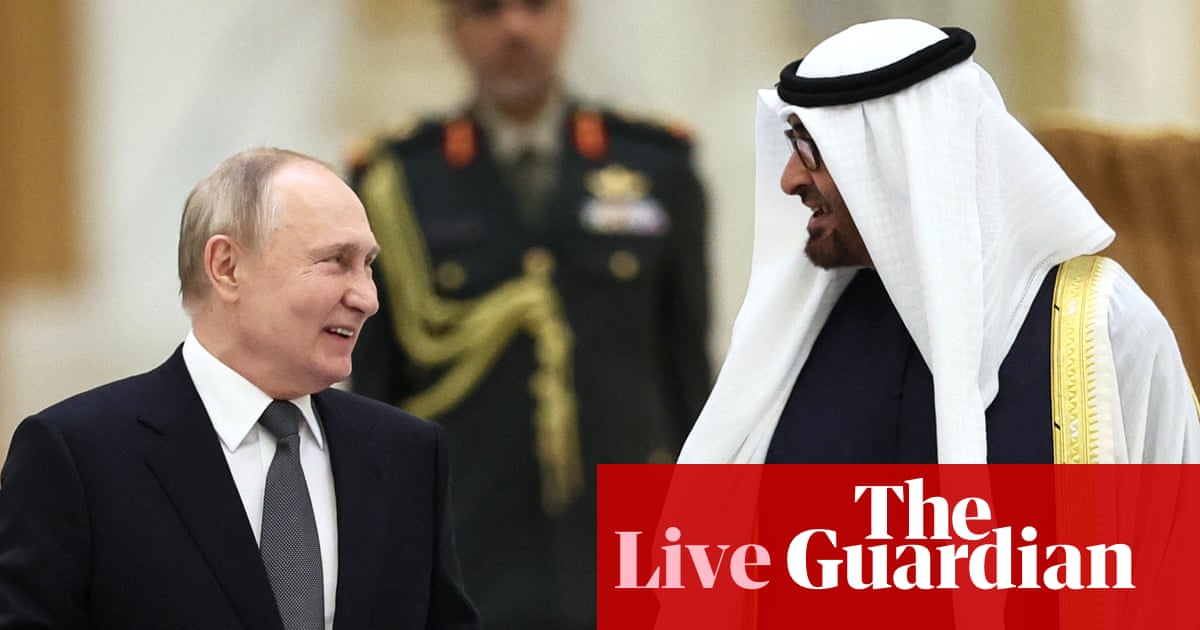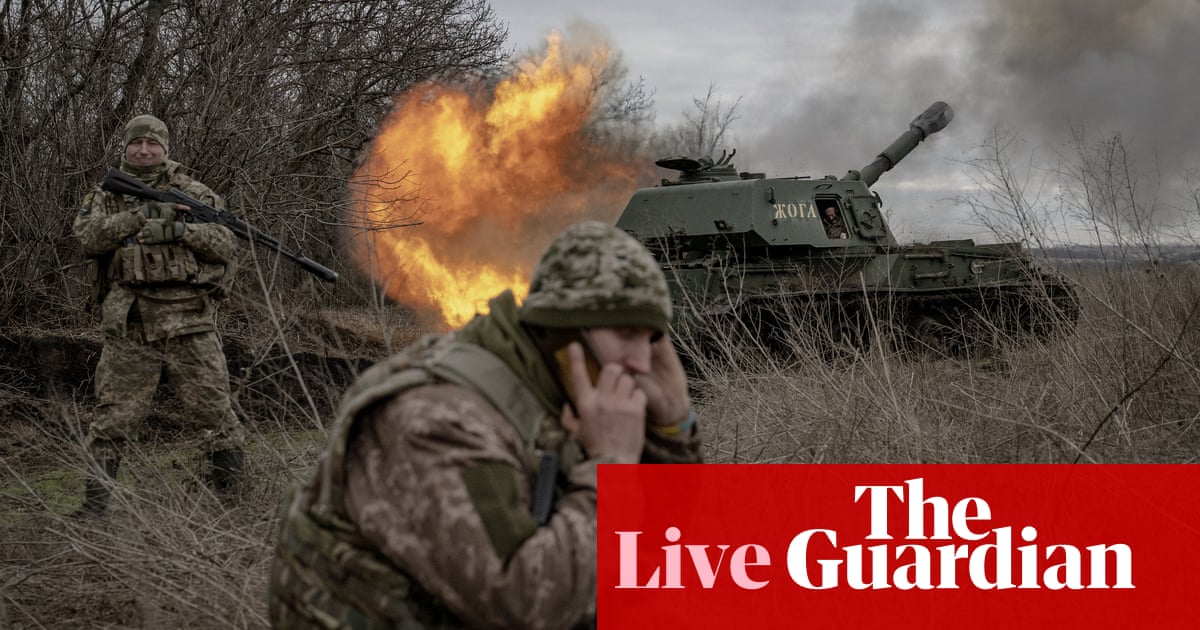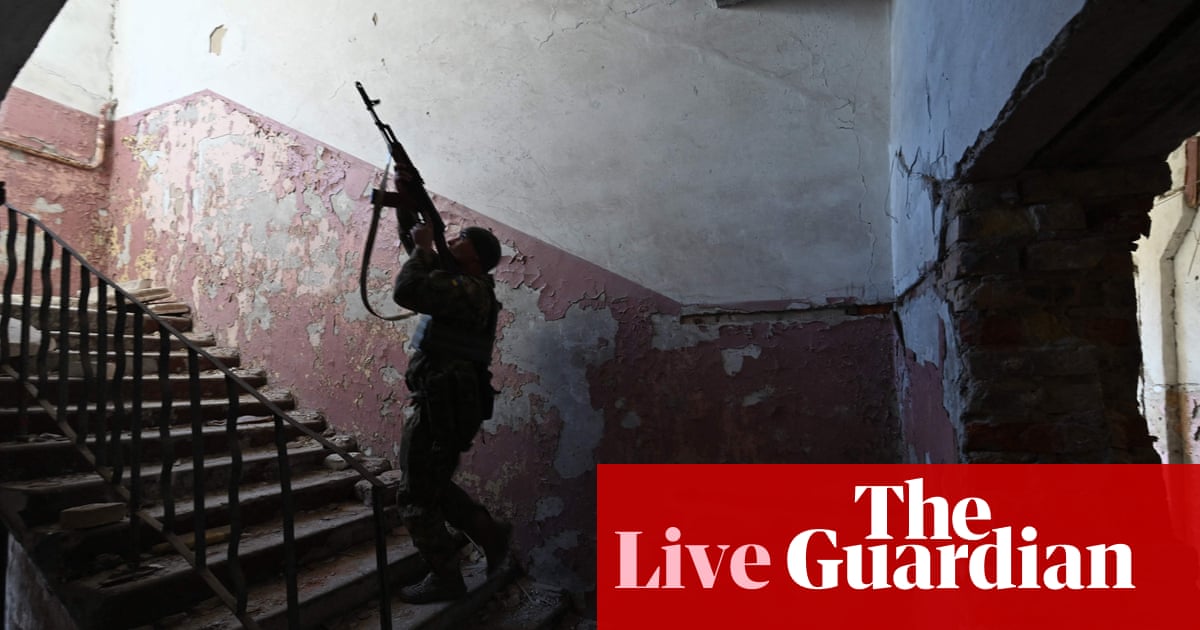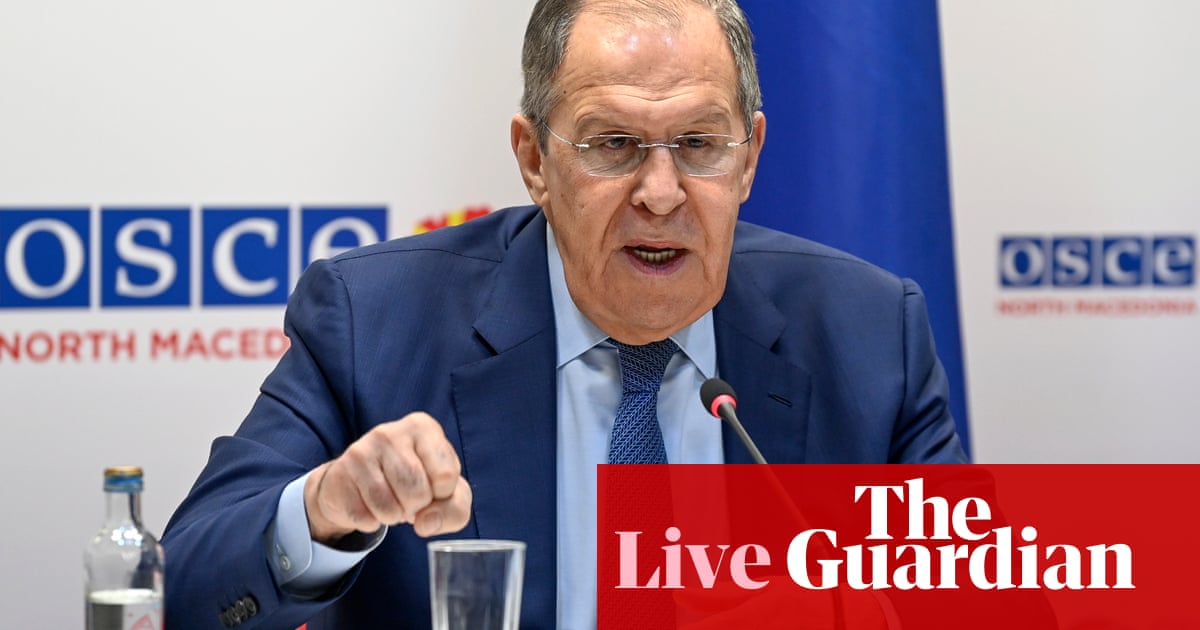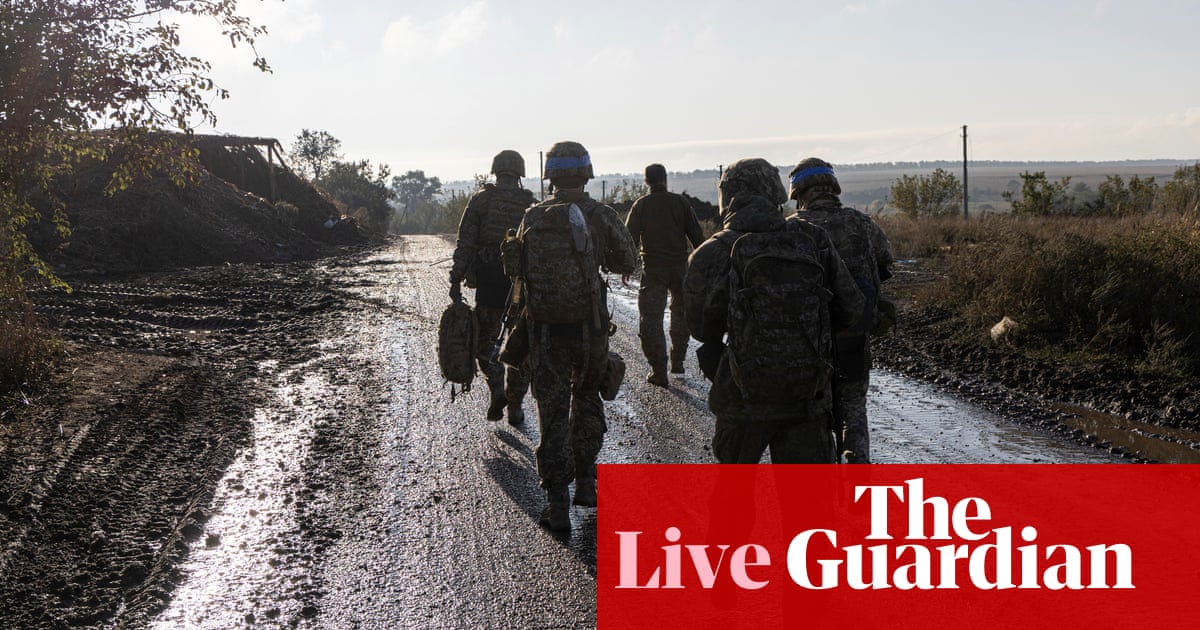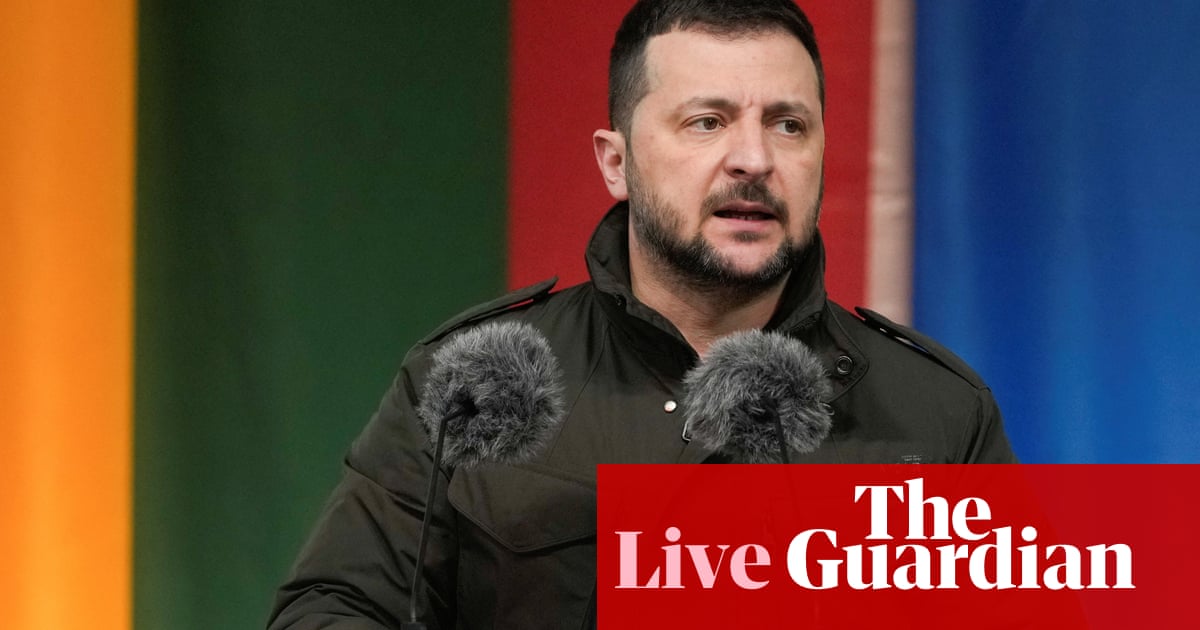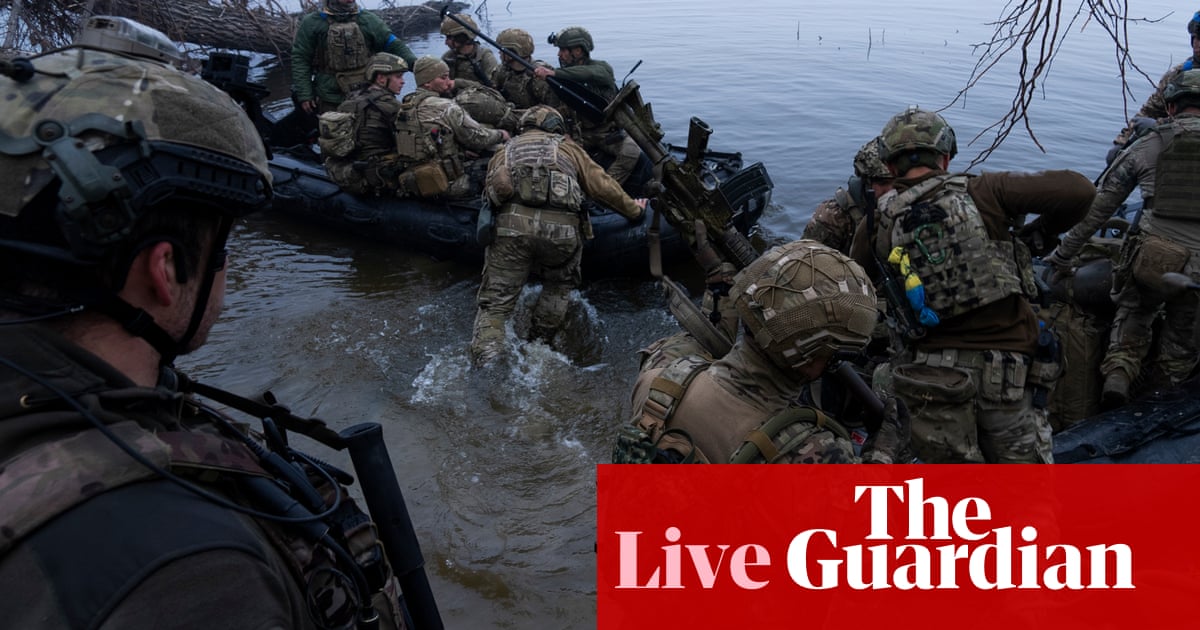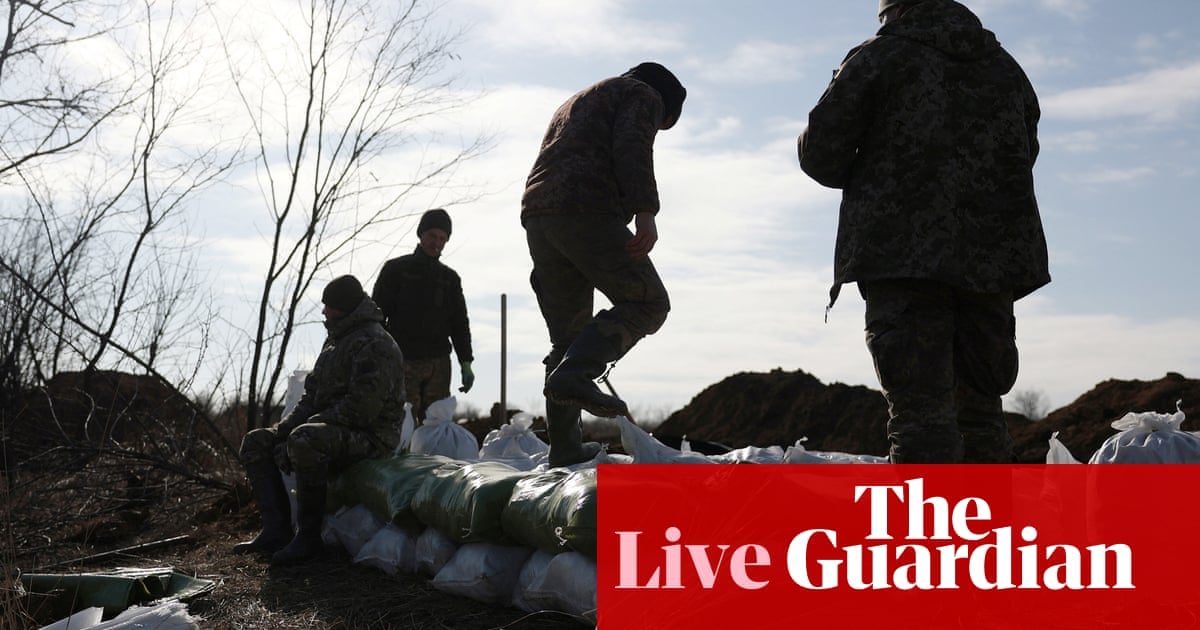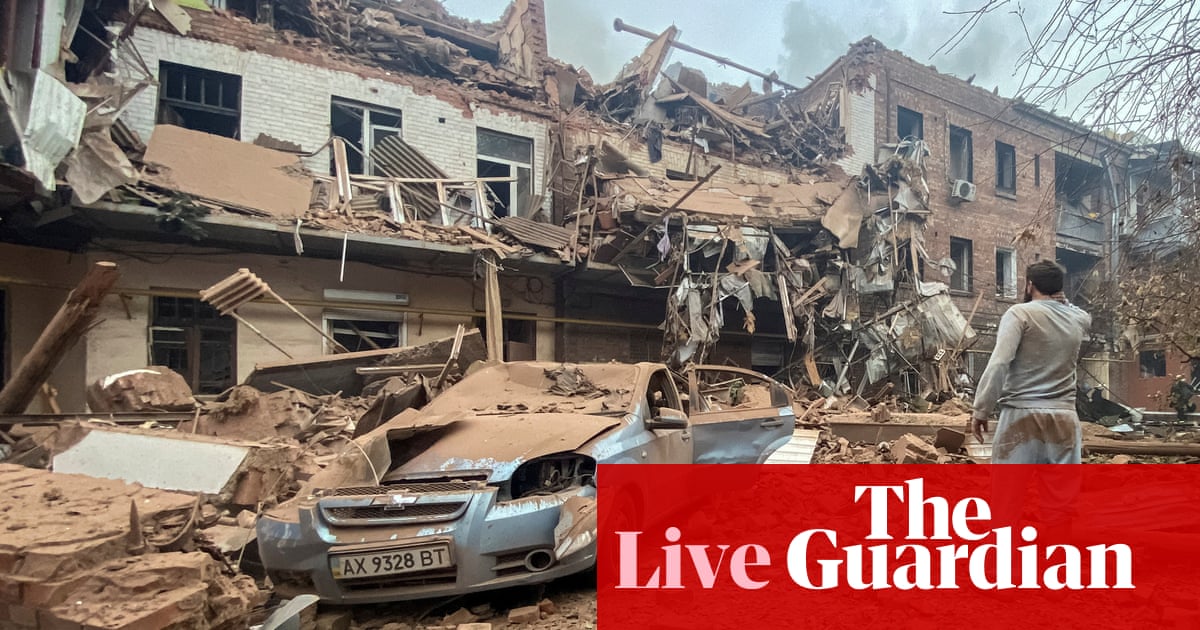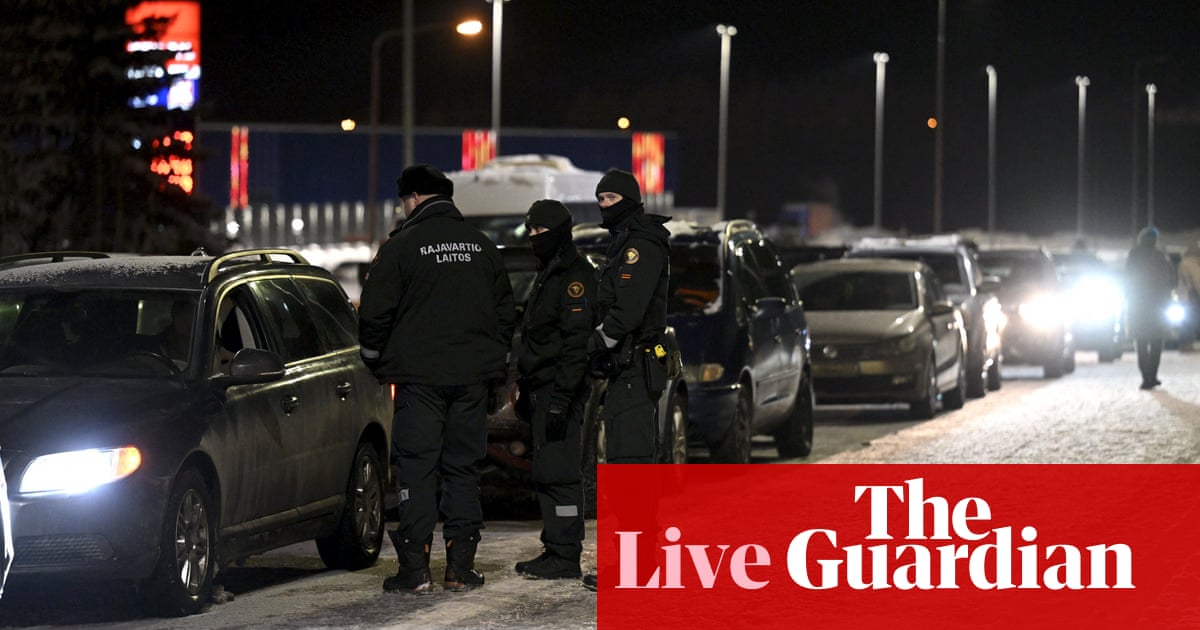
Closing Summary
It’s close to 6pm in Kyiv. Here is a summary of Sunday’s major developments in Ukraine’s war against the Russian invasion.
Russian president, Vladimir Putin, vowed to make Russia a “sovereign, self-sufficient” power in the face of the west. In a campaign speech he accused the west of unsuccessfully trying to “sow internal troubles” in Russia.
Putin also warned of “problems” with neighbouring Finland after it joined Nato earlier this year. Russia plans to reorganise military divisions to station more troops in its north-west region, by the EU and Nato border.
But Putin dismissed claims from the US president, Joe Biden, that Russia could attack a Nato country as “nonsense”. It came after Biden said Putin would not stop at Ukraine if it secures victory, as he pleaded with Republican lawmakers to authorise further aid to Kyiv.
Visit of Ukraine’s president, Volodymyr Zelenskiy, to Washington DC last week has yet to bear fruit as Biden called lack of congressional support for aid a “Christmas gift” to Russia. Biden has requested $61.4bn (£48.4bn) in further aid to Ukraine but Republicans in Republicans in Congress have rejected the proposals.
But one top Democrat said he was “very optimistic” about a resolution. US congressional negotiators worked deep into the weekend in a bid to craft an urgent deal linking aid to Ukraine and Israel to new border security. “I’m very encouraged,” said senator Joe Manchin.
Russia is not interested in extending the Black Sea grain deal, the agriculture minister said. The deal led to 33m tonnes of grain leave Ukraine’s ports before it collapsed in July.
Ukraine claims Russia has suffered almost 350,000 troops dying or being injured. The figure is higher than the 315,000 estimated by US intelligence, according to reports, but even that represents a significant toll for Moscow.
Ukraine continued its use of “memetic warfare” as the defence ministry posted a video of two Russian tanks being destroyed, with guitar music and the caption “WELCOME TO UKRAINE”. Scholars have tracked the use of memes to try and grab control of the war narrative.
An intelligence report from the UK Ministry of Defence said Russia is likely to deploy “electoral fraud and voter intimidation” when elections take place in occupied Ukrainian territories. Donetsk, Luhansk, Kherson and Zaporizhzhia will vote in March’s presidential elections but they are expected to not be “free or fair”.
It comes as Putin was confirmed to be running for president again as an independent candidate in Russia after two decades in power. Russian news agencies reported the news on Saturday, with the victory of Putin, 71, a formality.
Russia continued to batter Ukrainian targets with mortars overnight, with Dnipro in the centre, Sumy in the north and Zaporizhzhia in the south-east hit with artillery.
Russian rocket forces have loaded a new Yars intercontinental ballistic missile into a silo at the Kozelsk base south-west of Moscow. The missiles are capable of delivering multiple nuclear warheads.
More than a year after the Russians retreated from Izium, the Ukrainian city is wracked by suspicion and distrust about collaborators. Read Shaun Walker’s Observer dispatch from a city still in ruins here.
Lorry blockades are continuing at the Polish-Ukrainian border. Polish drivers say Ukraine is undercutting them as about 2,150 Ukrainian lorries remain stuck in Poland unable to return.
That’s all from me, Jem Bartholomew in London, and for The Guardian’s live coverage of the Russia-Ukraine war for today. Thanks for following along. See you next time.
When Moscow launched its large-scale invasion of Ukraine in February 2022, western powers imposed strict sanctions and western companies began pulling out of Russia.
Across Russia, Krispy Kreme became Krunchy Dream, Starbucks is now Stars Coffee, McDonald’s morphed into Vkusno i tochka – western companies were repurposed for Russian consumers.
But this mass exit of western businesses created an opportunity for Russia to raid their assets, blocking exits and setting the terms of withdrawal to turn a “boycott into a bonanza”, according to an investigation published by the New York Times on Sunday.
The result is “one of the biggest transfers of wealth within Russia since the fall of the Soviet Union”. Read the full story here.
Mr Putin has turned the exits of major western companies into a windfall for Russia’s loyal elite and the state itself. He has forced companies wishing to sell to do so at fire-sale prices. He has limited sales to buyers anointed by Moscow. Sometimes he has seized firms outright.
A New York Times investigation traced how Putin has turned an expected misfortune into an enrichment scheme. Western companies that have announced departures have declared more than $103bn in losses since the start of the war, according to a Times analysis of financial reports. Putin has squeezed companies for as much of that wealth as possible by dictating the terms of their departure.
He has also subjected those exits to ever-increasing taxes, generating at least $1.25bn in the past year for Russia’s war chest.
No private deal is safe. The Dutch beer company Heineken, for example, found a buyer this spring and set a price. But the Russian government unilaterally rejected the deal, people close to the negotiations said, and put the company’s Russian holdings in the hands of an aerosol-packaging titan married to a former Russian senator.
In all, Putin has overseen one of the biggest transfers of wealth within Russia since the fall of the Soviet Union. Huge swaths of industries – elevators, tires, industrial coatings and more – are now in the hands of increasingly dominant Russian players.
The war in Ukraine has driven up cases of domestic violence, as soldiers returning traumatised from the frontlines were more likely to abuse partners, according to police records.
For TIME and the Fuller Project, Jessie Williams reported from Lviv last year on how war impacts women and girls. This week, one year on, Williams provided an update on her reporting.
Since my first reporting trip to Lviv in western Ukraine, there have been some positive changes, such as more focus on psychological support for soldiers, sources said. But they warned much more needs to be done to address attitudes towards domestic violence committed by military personnel.
Vilena Kit, a psychologist treating traumatised soldiers, said there has been a big push to introduce rehabilitation programmes including psychological treatment. Ukraine’s first lady, Olena Zelenska, has been advocating for more awareness around mental health. She initiated the launch of a government mental health support programme that aims to provide affordable and high-quality services to those in need, including veterans returning from the front.
Marta Vasylkevych, the head of Lviv police’s domestic violence prevention unit, said that while cases of domestic violence committed by military personnel are common, “they are not systemic in nature”.
Others disagreed, including Halyna Fedkovych, a lawyer and co-founder of the Centre for Women’s Perspectives in Lviv, which helps survivors.
She pointed to data from the court decisions registry showing that in the first eight months of 2023 cases of domestic violence cases by a soldier or military personnel doubled compared to the same period in 2022.
During the first 10 months of 2023, there were 11,223 reports of domestic violence in the Lviv region, but only 294 criminal proceedings were opened.
Russia likely to use electoral fraud and voter intimidation in occupied territory elections, UK intelligence says
An intelligence update from the UK Ministry of Defence on Sunday said Russia is likely to deploy “electoral fraud and voter intimidation” when elections take place in occupied Ukrainian territories.
Moscow announced last week that the occupied Donetsk, Luhansk, Kherson and Zaporizhzhia regions of Ukraine would participate in voting in Russia’s March presidential elections. Vladimir Putin is running for another term and his victory is considered a formality.
“The Russian administration will almost certainly utilise methods including substantive electoral fraud and voter intimidation to ensure Russian president Vladimir Putin wins in the regions by a substantial margin,” the MoD said, adding that the elections would “be neither free nor fair”.
The intelligence report suggesting the elections were a way for the Russian regime to provide legitimacy for its occupation of Ukrainian territory.
In September, Russia held elections in the occupied territories of Donetsk, Kherson, Luhansk, Zaporizhzhia and the Crimean peninsula, and the Central Election Commission said Russia’s ruling party won the most votes. Ukraine’s foreign ministry called them “fake elections”.
North Korea launched a short-range ballistic missile towards the sea on Sunday, South Korea’s military said, as Pyongyang called the US and South Korea “thugs” performing “reckless military manoeuvres” in the region.
The North Korean defence ministry said the arrival of the US nuclear-powered submarine USS Missouri off South Korea as the latest act that proves Washington is contemplating nuclear war, Reuters reports, citing the state news agency KCNA.
Russia, which shares a 10.5-mile (17km) border with North Korea, is the communist regime’s second most-important ally, after China.
“North Korea fires unidentified ballistic missile towards the East Sea,” Seoul’s Joint Chiefs of Staff said, according to AFP, referring to the body of water also known as the Sea of Japan.
The ballistic missile launch followed combined military exercises between South Korea and Japan, as tensions on the Korean peninsula are at their highest point in years.
About 20 minutes after initially reporting the launch, the Japanese coast guard said the missile had already fallen, Reuters reported.
Putin vows to make Russia "self-sufficient" from west in campaign speech
The Russian president, Vladimir Putin, vowed to make Russia a “sovereign, self-sufficient” power in the face of the west, in a campaign speech before running again for president in a March election.
“We must remember and never forget and tell our children: Russia will be either a sovereign, self-sufficient state, or it will not be there at all,” the Russian president said, according to AFP, during a congress of the ruling United Russia party.
“Russia cannot – like some countries – give away its sovereignty for some sausage and become someone’s satellite,” Putin said, as he accused the west of unsuccessfully trying to “sow internal troubles” in Russia.
Putin has been in power, as both prime minister or president, for more than two decades . His victory in March is considered a formality.
Ukraine ups meme warfare as defence ministry posts clip of Russian tank blasts
Jem Bartholomew
Ukraine’s fight against the Russian invasion has taken many forms – brutal trench warfare on the frontlines, drone sabotage deep into enemy territory, cyberwarfare on Russia’s military infrastructure.
Now, as the frontline hits stalemate with bitter winter sweeping in, another form of warfare comes to the fore: memes.
Since Russia’s full-scale invasion began in February 2022, Ukraine has used memes and savvy internet strategies to keep Ukrainian morale high and increase support in the rest of the world. Scholars have referred to this as “memetic warfare” that is deployed to help control the narrative.
On Sunday, the X/Twitter account of Ukraine’s ministry of defence posted a video of two Russian tanks being destroyed by Ukrainian missiles. The video features dramatic music with electric guitars and drums and, after the Russian tanks are destroyed, says in bold text: “WELCOME TO UKRAINE.”
According to a report from the Brookings Institute, a US thinktank, in February this year, memes are “concurrent and complementary to [Ukraine’s] military efforts, suggesting that they are meant to play a supporting role”, and that they are designed for a range of audiences, “including Ukrainian citizens, expatriate audiences abroad, and Russians, especially soldiers’ families”.
The report said wartime memes were generated primarily from below, by Ukrainian citizens, but also from official sources in efforts to combat war fatigue.
Last year, the Ukrainian post office released commemorative stamps of a Ukrainian soldier sticking a middle finger up to the Russian Moskva warship, which was sunk in April 2022. The stamp referenced a recording of Ukrainian soldiers who said over radio airwaves, “Russian warship, go fuck yourself”, which became a meme and symbol of resistance.
A paper from Olga Tokariuk, at the University of Oxford’s Reuters Institute for the Study of Journalism, found memes, particularly those using humour, had a “strategic power”.
“In times of war, humour becomes a powerful weapon to overcome fear,” Tokariuk wrote. “It not only highlights the failures of the opposing forces but also serves to boost morale. Ukrainians found solace in laughter, turning the once formidable Russian army into subjects of ridicule.”
Lorry blockades are continuing at the Polish-Ukrainian border, with about 2,150 Ukrainian lorries stuck in Poland unable to return, according to the Kyiv Independent.
Blockades are continuing at three crossing points, the newsroom quotes a spokesperson for Ukraine’s border guard service,Andrii Demchenko, as saying.
The blockades are caused by Polish protestors. The Polish drivers feel undercut and want the EU to restore a transport permit scheme that limited the number of Ukrainian drivers able to operate in Poland to 200,000 entries a year. They say the lifting of restrictions in the months after Russia’s full-scale invasion of Ukraine in 2022 has hit their earnings.
“We demand the reinstatement of the pre-2022 system of transport permits,” Rafal Mekler, the Polish protest organiser has said. He said on X, formerly Twitter, his intention to extend the blockades until 1 February 2024.
Critics have said the Kremlin is benefiting from the border choas.
The rightwing PiS party left government in Poland this week, marking a change to a more pro-Ukrainian foreign policy. But the new government of Donald Tusk, who took over as prime minister on 13 December, may not signal a major change to the situation, according to this piece in the Kyiv Independent, as economic competition between the two countries remain.
For a primer on the Polish border blockades, here is Luke Harding’’s dispatch from Medyka.
Summary
It’s 2pm in Kyiv and here is a summary of Sunday’s major developments in Ukraine’s war against the Russian invasion.
Russian president Vladimir Putin warned of “problems” with neighbouring Finland after it joined Nato earlier this year. Russia plans to reorganise military divisions to station more troops in its north-west region, by the EU and Nato border.
But Putin dismissed US president Joe Biden’s claims that Russia could attack a Nato country as “nonsense”. It came after Biden said Putin would not stop at Ukraine if it secures victory, as he pleaded with Republican lawmakers to authorise further aid to Kyiv.
Ukraine president Volodymyr Zelenskiy’s visit to Washington DC last week has yet to bear fruit as Biden called lack of Congressional support for aid a “Christmas gift” to Russia. Biden has requested $61.4bn (£48.4bn) in further aid to Ukraine but Republicans in Republicans in Congress have rejected the proposals.
Russia is not interested in extending the Black Sea grain deal, the agriculture minister said. The deal led to 33m tonnes of grain leave Ukraine’s ports before it collapsed in July.
Ukraine claims Russia has suffered almost 350,000 troops dying or being injured. The figure is higher than the 315,000 estimated by US intelligence, according to reports, but even that represents a significant toll for Moscow.
Russia continued to batter Ukrainian targets with mortars overnight, with Dnipro in the centre, Sumy in the north and Zaporizhzhia in the south-east hit with artillery.
Russian rocket forces have loaded a new Yars intercontinental ballistic missile into a silo at the Kozelsk base south-west of Moscow. The missiles are capable of delivering multiple nuclear warheads.
More than a year after the Russians retreated from Izium, the Ukrainian city is wracked by suspicion and distrust about collaborators. Read Shaun Walker’s dispatch from a city still in ruins here.
Turkey, Romania and Bulgaria plan to sign a deal in January on a joint plan to clear mines floating in the Black Sea as a result of the war in Ukraine. The Turkish defence minister Yaşar Güler broke the news on Saturday after months of talks between the Nato allies.
Vladimir Putin will run for president again as an independent candidate in Russia after two decades in power. Russian news agencies reported the news on Saturday, with the victory of Putin, 71, a formality in the authoritarian country.
Hungary will veto Bulgaria’s entry into Europe’s passport-free Schengen zone unless it scraps a transit tax on Russian gas. It comes after Hungary blocked further funding to Ukraine at a summit this week but did not block Ukraine beginning EU accession talks.
Imprisoned Wall Street Journal reporter Evan Gershkovich met the US ambassador in prison on Friday. Gershkovich has been detained in Russia since March on trumped up charges of “espionage”, but Putin said last week that Russia wants to reach a return agreement with the US.
The Russian deputy prime minister, Alexander Novak, said Moscow would increase its oil export cuts in December as part of an Opec+ deal, Reuters reports, citing the Interfax news agency.
It comes as the world’s biggest exporters, Russia and Saudi Arabia, try to support the global price of oil. Novak said Russia would deepen cuts to below the 300,000 barrels a day already agreed, Interfax reported.
Russia not interested in extending Black Sea grain deal, state news agency reports
Moscow is not interested in extending the Black Sea grain deal, according to the state-owned RIA news agency, citing the agriculture minister, Dmitry Patrushev.
The deal, which was a diplomatic coup when negotiated by Turkey in July 2022, collapsed after Russia pulled out in July.
The deal allowed commercial food and fertiliser (including ammonia) exports from three key Ukrainian ports in the Black Sea – Odesa, Chornomorsk and Pivdennyi – and led to 33m tonnes of grain leaving Ukraine’s ports in the year to July.
“Our grain export volumes, taking into account the winding down of the grain deal, have by no means fallen, they even slightly increased,” RIA quoted Patrushev as saying.
Egypt and other countries called on Vladimir Putin to revive the grain deal in July, but the Russian president said in September that Moscow would only rejoin if the west fulfilled a separate memorandum agreed with the UN to facilitate Russian food and fertiliser exports.
For a primer on the deal and why it collapsed this summer, see Patrick Wintour’s piece here:
Russian rocket forces have loaded a new Yars intercontinental ballistic missile into a silo at the Kozelsk base south-west of Moscow, Reuters reports, citing the defence ministry.
“In the Kozelsky compound, Strategic Missile Forces loaded a Yars intercontinental ballistic missile into a silo launcher,” the defence ministry said of a rocket capable of delivering multiple nuclear warheads.
Reuters has further details:
The defence ministry released a clip of the giant missile being transported to a silo and loaded into a shaft. It accompanied the video with pounding rock music.
Russia has the world’s largest arsenal of nuclear weapons, closely followed by the United States. Together, Russia and the US control more than 90% of the world’s nuclear weapons.
Russia has about 5,889 nuclear warheads while the US has about 5,244, according to the Federation of American Scientists. Of those, Russia and the United States each have about 1,670 strategic nuclear warheads deployed.
Russia and Ukraine traded dozens of attack drones on Sunday, with at least one Ukrainian civilian killed, as aerial drone warfare continues to form a critical element of the fighting.
With the frontlines increasingly entrenching into deadlock as bitter weather sweeps in, drones have become an even more significant tool in a war already defined by their prolific use. The explosion of cheap drones on the commercial market in recent years has made them useful weapons for surveillance and attacks deep into enemy territory.
For the latest on drone attacks this weekend, AP has more details below:
At least 35 Ukrainian drones were shot down overnight over three regions in southwestern Russia, the Russian defence ministry said in a post on the messaging app Telegram.
A Russian airbase hosting bomber aircraft used in Ukraine was among the targets, according to a Russian Telegram channel critical of the Kremlin. The channel posted short videos of drones flying over low-rise housing in what it claimed was the Russian town of Morozovsk, whose air base is home to Russia’s 559th Bomber Aviation Regiment.
Vasily Golubev, the governor of Russia’s Rostov province, separately reported “mass drone strikes” near Morozovsk and another town farther west, but did not mention the airbase. Golubev said most the drones were shot down and and there were no casualties. He did not comment on damage.
Also on Sunday morning, Ukraine’s air force said it shot down 20 Iranian-made Shahed drones launched overnight by Russian troops in southern and western Ukraine, as well as one X-59 cruise missile launched from the country’s occupied south.
A civilian was killed overnight near Odesa, a key port on Ukraine’s southern Black Sea coast, after the remnants of a destroyed drone fell on his house, Ukraine’s military said.
The has been a step-up in drone attacks over the past month as both sides are keen to show they are not deadlocked as the war approaches the two-year mark. Russia’s defence ministry on Friday evening said its anti-aircraft units destroyed 32 Ukrainian drones over the Crimean peninsula, which Moscow annexed from Ukraine in 2014. Ukraine’s air force on Saturday said it had shot down 30 out of 31 drones launched by Russia against 11 Ukrainian regions the previous night.
Here are some of the latest photos coming out of the war zone this weekend.




